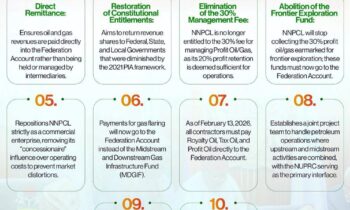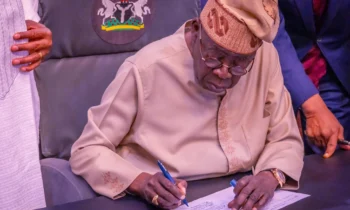
Olusola Bello
Former Director-General of the Lagos State Chamber of Commerce and Industry, Muda Yusuf, has backed the removal of fuel subsidy, saying the move is necessary for the nation’s economy to stand.
Last week, the Minister of Finance, Budget and National Planning, Zainab Ahmed, had announced that the government would remove fuel subsidy and replace it with a monthly N5,000 transport stipend to about 40 million poor Nigerians.
Speaking during an interview on Channels Television’s Sunrise Daily, Yusuf condemned a situation, whereby the Federal Government spends N3 trillion annually on fuel subsidies.
“For this economy to continue to stand, this is something that has to happen. Look at the macro-economic effects, look at the effect on our reserves, look at the effect on our foreign exchange and more importantly, look at the effect on investments,” he said.
“How can we have a sector as important as the petroleum sector and we have a policy that is practically blocking investments into that sector because that is what this thing is doing.
“We cannot continue with a situation whereby we will be spending close to N3 trillion annually on subsidies and not just because of that, because of the investment, macro-economic implication,” he said.
“We are almost feeding the entire West African sub-region with our PMS. That is not sustainable unless we want to cripple the entire economy.”
He believes the current administration should channel the money being spent on subsidies to primary healthcare, basic education and rural roads.
While noting that the new government’s policy would not be easy on Nigerians, the former LCCI boss said the subsidy removal would have a lot of social implications.
One of these, he stated, includes inflationary implications, political costs for the ruling All Progressives Congress (APC) among other challenges.
According to Yusuf, the government has engaged the masses by proposing a minimum of N5,000 per month to about 40 million vulnerable masses .
The World Bank Country Director for Nigeria, Shubham Chaudhuri has again reemphasized the importance of removing subsidy to the economy and therefore called on the Nigerian government to consider the opportunity cost of its continued fuel subsidy practice and decide whether to end the policy completely or maintain the waste and drain on its scare resources.
Chaudhuri who spoke yesterday, during a courtesy visit by some of the World Bank team in Nigeria to THISDAY Newspapers in Lagos, where he was received by the company’s Managing Director, Mr. Eniola Bello.
According to Chaudhuri, “Nigeria must bring to the table, the opportunity cost of subsidy and consider whether to remove fuel subsidy or continue to subsidise it. Our estimate at World Bank is that up to 10 million Nigerians have fallen into poverty because of the rising inflation in the country.
“Part of the rise in inflation is attributed to lack of jobs, and those that have jobs are lowly paid and their basic needs are rising while their income are not rising. The truth is that the increase in Premium Motor Spirits (PMS) will not give t much needed impact to cushion the effect of the rising inflation in the country.”
He, however, said the removal of fuel subsidy may not necessary put a stop to the high inflation currently being experienced by Nigerians.
According to him, Nigeria must invest in healthcare, road infrastructure, agriculture and education in order to reduce inflation. He said the World Bank had always provided incentives for financing and beyond financing in order to make life better the lives of poor people globally.
Chaudhuri, who also spoke about public spending and waste in government said the old idea of business as usual must be discouraged in Nigeria, and that Nigerians should begin to hold government accountable and have a paradigm shift from the old ways of doing the same thing over and over again, at the detriment of the Nigerian populace.
He said for Nigerian government to be able to provide basic amenities for all its citizens, government must cut its public speed and reduce wastage to the nearest minimum. Government must concentrate on providing quality services to the people.
“If Nigeria must spend up to 25 per cent of its resources on fuel subsidy, such money could be transferred to the federation account and have it approved by as an expenditure item by the National Assembly. This will remove corruption and help the poor to benefit from Nigeria’s rich resources,” Chaudhuri said.
Speaking about Nigeria’s borrowing from global institutions and from foreign countries, Chaudhuri said what matters was whether Nigeria was borrowing for the right reasons.
Addressing the issue of technology startups in Nigeria, Chaudhuri said the World Bank had various programmes enabling the growth of startups in Nigeria and in Africa, and that Nigerian startups have benefitted a lot from the World Bank programme on startups development.
Eniola welcomed Chaudhuri and his team and advised that the World Bank should look more into African government borrowing, spending and wastage in order to save for their citizens.





